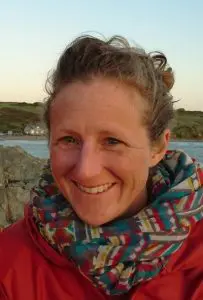Research spotlight: Our 2021 Harold Samuel Research Prize joint recipient, Dr Katharine van Someren
Posted on: 24 January, 2022
Research is an essential component of university life, whether it’s students researching for dissertations or assignments or academic staff deepening their understanding of a topic.
We encourage those with an interest in the built environment to submit research proposals with the potential to provide sector-changing insight through the Harold Samuel Research Prize – an annual award of up to £15,000 which goes towards such projects.
Towards the end of last year, we gave out the 2021 prize, split between two researchers. Here, we learn more about the first recipient, Dr Katharine van Someren, her project and her thoughts on the year ahead…

Dr Katharine van Someren
Originally a physics graduate, Katharine retrained and worked as a chartered planning and development surveyor, working with private commercial developers and for a FTSE 100 real estate investment trust (REIT).
Mid-career, she returned to study an engineering doctorate with the Technologies for Sustainable Built Environments Centre (at the University of Reading), producing multi-disciplinary, industry-based research on reducing carbon emissions in large educational estates. Working alongside an award-winning energy team at the University of Reading, the university met its emissions reduction target of 35% in 2017.
Katharine works freelance as a project manager, primarily focused on building performance evaluation to reduce carbon emissions. Mentoring colleagues, apprentices and students, and supporting them in their studies is an area where she practices workplace mental health and wellbeing. As a UCEM associate tutor, she tutors students and supports them with their MSc projects, leading the ‘Development Process and Appraisal’ module.
The winning project – workplace poverty in construction
Katharine writes: ‘Workplace poverty in UK construction is a big issue and a topic not previously addressed in published literature. In 2019/2020, 12% of the construction sector was in work poverty in London. There is a strong correlation between high foodbank usage and areas with people in skilled manual work. The construction industry is forecast to require over 200,000 new workers by 2025 to meet demand.
‘In-work poverty can affect people of all age groups. This research looks at all age ranges and is particularly interested in workplace poverty, whether this is not having sufficient funds to afford food and secure habitable accommodation or have any disposable income to pay into a pension.
‘This research topic addresses economic and societal issues surrounding a choice to work in the construction industry as opposed to other sectors. As successful construction business leaders, we want our staff to have a decent living standard and access to opportunities for sustainable wage growth. This means addressing workplace poverty and opening up conversations about how people are living in poverty.’
The year ahead
We caught up with Katharine to gain her reaction to the prize win and learn what the year ahead holds.
How does it feel to be the joint recipient of the 2021 Harold Samuel Research Prize?
I feel really excited and thankful to be researching a topic that is close to my heart. The reason I chose this topic is because I want people to open up conversations about financial struggles and mental health. I think it’s easy to assume that early career, mid-career or even in your retirement, you can make ends meet – when sometimes you just can’t with family circumstances and ill health.
What will it take to complete your research?
At the start, I’ll be looking at each topic in depth, discovering the data that exists already and creating a survey that is meaningful to this study. Next, it will take a number of volunteers to help collect data anonymously to gather further understanding around these topics. Finally, I will need to analyse the data and write up the findings for sharing with survey participants and UCEM.
How will you be recruiting participants to contribute original data?
Using social media contacts, industry bodies and trade associations will help recruit participants. Any adult working in construction can take part, no matter if you are self-employed or in a larger company.
What do you hope to achieve through the research?
My research will aim to find out about how committed people are to their career sector, their mental health, financial wellbeing and if they feel secure in their work. I hope it will create a greater understanding and evidence of resilience and wellbeing in the UK construction industry.
Thanks for sharing your thoughts, Katharine, and best of luck with it!





